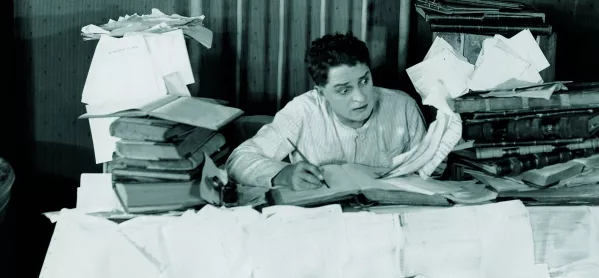- Home
- How to create an inspirational writing curriculum
How to create an inspirational writing curriculum

My school, Phillips Exeter Academy in New Hampshire in the US, recently sent a survey to former students who are studying at undergraduate level.
We asked them which of our academic courses had helped to prepare them for college.
As a member of the English department, I was particularly struck by the comments related to our curriculum, with students praising the level they were able to write at (often far above those of their peers).
Quick read: How I made a life-changing creative writing group
Quick listen: Is it a school’s job to prepare pupils for work?
Want to know more? Why handwriting matters more than ever
But I was not surprised.
The English curriculum at Exeter is markedly different from the one I experienced as a student in Northern Ireland, and as a teacher in England prior to taking a job in the US.
Rather than training students to respond under timed conditions to analytical prompts, we use literature to spark personal narratives, with the aim of developing voice and preventing them from approaching writing as a formulaic exercise.
The results can be truly astounding.
Making writing personal
In the ninth grade, our youngest year and the equivalent to the first year of GCSE, students are asked to write short personal narrative moments that capture the sensory detail involved in a scene.
They might read a poem by Natasha Trethewey or Tyehimba Jess, or a short story by Julia Alvarez, and then write about a moment in their kitchen at home.

Their papers will be less than a page in length, and will go through multiple drafts so they can incorporate sound and touch if their first draft is solely visual.
They learn about the importance of micro and macro descriptions, and they experiment with voice and tone.
‘Spiral of complexity’
In tenth grade, they add perspective, varied locations and time, and their narratives become longer.
The major paper in this grade is an exploration of a family story, and students sometimes choose to write as an ancestor or include themselves as characters within their own work.
We often use the phrase “a spiral of increasing complexity” to describe our reading and writing curriculum, and this leads us to the eleventh grade where students turn their gaze from the self and family to the world of others.
Many undertake a lengthy reporter-at-large project, where they explore the story and work of someone outside of their family.
Ideally, they shadow the individual at their job, and juggle multiple writing styles in incorporating dialogue, unfolding action, explanation of the work itself, the back story and character of their chosen person, and more.
Moving to meditation
In the final year, students write a meditation, an extended reflection on a topic of personal significance.
The best of these are selected for delivery in our school church in the spring term, and a book of the delivered meditations is published each year.
At all levels, students are encouraged to see writing as a process involving feedback and revision, and are given multiple opportunities to work with peers, with their teachers and with our writing centre, in order to hone their craft.
Real writers
Many members of the department are published writers. We have a poetry series that invites three poets onto campus per year to read and give workshops to the students.
This series has included some of the biggest names in poetry, from Borges all the way back in 1983, through to such luminaries as Oliver, Heaney, Brooks, Brodsky, Walcott, Ginsberg, Boland, Gluck, Hass, and most recently Elizabeth Alexander.
Exeter’s own graduate writers include John Irving, Dan Brown, Gore Vidal, Roxane Gay, Chang Rae Lee, and many more.
And with the curriculum giving such weight to the students’ own voices and experiences, I look forward to adding to the lengthy list of Exeter writers in the decades ahead.
Eimer C Page is director of global initiatives at Phillips Exeter Academy in New Hampshire, US
Keep reading for just £1 per month
You've reached your limit of free articles this month. Subscribe for £1 per month for three months and get:
- Unlimited access to all Tes magazine content
- Exclusive subscriber-only stories
- Award-winning email newsletters



